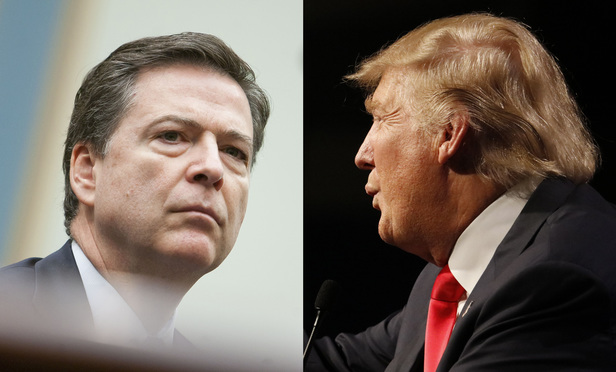 James Comey, Director of the FBI, testifies before the House Judiciary Committee during a hearing titled “The Encryption Tightrop: Balancing Americans’ Security and Privacy,” on March 1, 2016. Photo by Diego M. Radzinschi/THE NATIONAL LAW JOURNAL.
James Comey, Director of the FBI, testifies before the House Judiciary Committee during a hearing titled “The Encryption Tightrop: Balancing Americans’ Security and Privacy,” on March 1, 2016. Photo by Diego M. Radzinschi/THE NATIONAL LAW JOURNAL.
President Donald Trump’s latest tweet storm Friday renewed echoes of Watergate and raised new legal questions about Trump’s firing of James Comey earlier this week.
“James Comey better hope that there are no ‘tapes’ of our conversations before he starts leaking to the press!” Trump tweeted at 8:26 a.m. Eastern Daylight Time.
That comment alone could constitute obstruction of justice, Harvard Law School professor Laurence Tribe told The National Law Journal Friday. “That threat … is certainly pointed enough in the context of everything else we know including Trump’s own account of the dinner with Comey, to be part of a pattern of obstruction of justice.”
The fact that Comey is now a private citizen does not diminish the obstruction, Tribe added.
White House press secretary Sean Spicer on Friday declined to say whether Trump’s conversations with Comey or others are recorded. He did not elaborate on Trump’s tweet, but said, “That’s not a threat. The tweet speaks for itself.”
Whether or not Trump was telegraphing that such recordings actually exist, the mention of White House tapes recalled the recordings that led to President Richard Nixon’s downfall in 1974. Citing executive privilege, Nixon resisted a special prosecutor’s demand for release of taped conversations needed for the Watergate criminal investigation.
But the U.S. Supreme Court in United States v. Nixon ruled that “the president’s generalized assertion of privilege must yield to the demonstrated, specific need for evidence in a pending criminal trial and the fundamental demands of due process of law in the fair administration of criminal justice.” Nixon resigned within days.
Under that precedent, if an investigation of Trump regarding Russia or other matters does move forward, tapes of conversations – assuming they exist – could be subpoenaed, though the 1974 Supreme Court ruling carved out an exception for “a claim of need to protect military, diplomatic or sensitive national security secrets.”
Meanwhile Trump’s revelation to NBC News Thursday that he asked Comey, more than once, if he was under investigation by the FBI has triggered criticism, especially in light of The New York Times story Friday suggesting that Trump asked Comey to pledge his loyalty. Comey declined.
“The demand for loyalty from the head of the organization investigating those around you, when you have the power to fire that person — if you wrote a novel about obstruction of justice, this would almost be too good to be true,” Tribe told The Washington Post Friday.
The request for loyalty, if true, raised concerns that the FBI could be politicized.
“The events surrounding Comey’s firing raise questions for investigators in Congress and the Department of Justice,” said Caroline Fredrickson, president of the liberal American Constitution Society. “The dismissal politicized the bureau and jeopardizes the rule of law. What will stop the president from demanding loyalty from the next FBI director over a piece of chocolate cake?”
On Twitter, Tribe said Trump’s comments mean he can’t exercise executive privilege to stop Comey from testifying before Congress or in court about what was discussed.
On MSNBC Thursday night, Tribe also said a demand for loyalty in these circumstances was “the language of bribery, the language of the underworld.”
While federal statutes define obstruction of justice broadly to include most forms of influencing or impeding “any official proceeding,” it would be difficult to prove the president specifically intended to interfere with the investigation. On that score, Trump may have helped himself in the NBC interview by stating that he wanted the investigation into his campaign’s alleged ties to Russia to proceed and to be “done properly.”
Harvard Law School professor Alan Dershowitz wrote in a Washington Examiner column Thursday, “It should not be a crime for a public official, whether the president or anyone else, to exercise his or her statutory and constitutional authority to hire or fire another public official. For something to be a crime there must be both an actus reus and mens rea—that is, a criminal act accompanied by a criminal state of mind.”
At a White House briefing Thursday, deputy press secretary Sarah Sanders was peppered with questions about the propriety of the conversations between Comey and Trump. Sanders replied, “I don’t see that as a conflict of interest, and neither do the many legal scholars and others that have been commenting on it for the last hour.”




